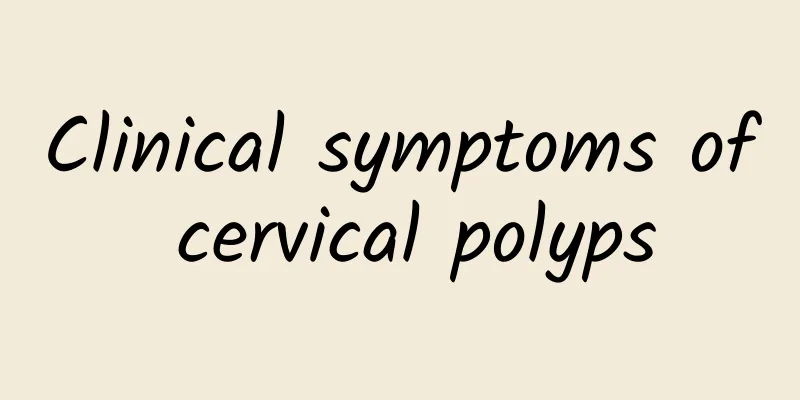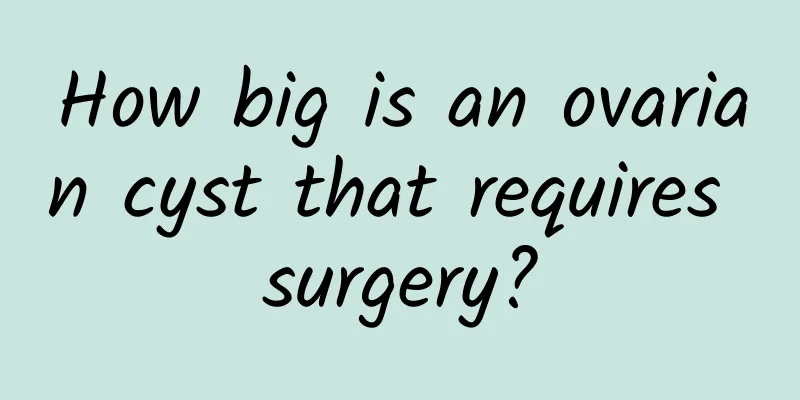Clinical symptoms of cervical polyps

|
Cervical polyps are a manifestation of chronic cervicitis, which is more common in married women. It can cause great harm to patients, so everyone should know more about this disease. Here we will talk about the clinical symptoms of cervical polyps. Due to the long-term stimulation of chronic inflammation, the cervical mucosa continues to proliferate and accumulate, and protrude from the basal layer of the mucosa to the external cervical opening, thus forming cervical polyps. The roots of polyps are mostly attached to the cervical canal or the external cervical opening. They are generally small, with a diameter of less than 1 cm, single or multiple. There are also larger ones, with a diameter of several centimeters, with pedicles, and protruding outside the cervical opening as they grow. Small polyps remain in the cervical canal and only slightly appear at the cervical opening. Understanding the clinical symptoms of cervical polyps: Although cervical polyps are a relatively common gynecological disease, they are easily overlooked due to their small size. More than one-third of patients lack obvious symptoms and are often discovered only when they are examined for other gynecological diseases. Even if there are symptoms, most of them are mild, mainly a small amount of bright red spotting, or a small amount of bleeding after sexual intercourse, which is sometimes mistaken for "return of menstruation". The amount of bleeding in a few people can be similar to menstruation. Some patients may have yellow leucorrhea at ordinary times, most of which have a peculiar smell, or blood in the leucorrhea; it can also manifest as vaginal bleeding after menopause, and unmarried patients often show that there is a tumor prolapse at the vaginal opening. Or the main complaint is contact bleeding, especially spotting or bloody leucorrhea after sexual intercourse or defecation, and the amount of bleeding is generally not much. Polyps covered with squamous epithelium on the surface generally have no contact bleeding or bloody leucorrhea due to their tough texture. If cervical polyps are accompanied by severe cervicitis, symptoms of cervicitis may also occur, but early examination and timely treatment are still required. Causes of cervical polyps: The cause of cervical polyps is generally believed to be due to long-term stimulation of chronic inflammation, which causes the proliferation and accumulation of the cervical endometrium. The above is a detailed introduction to the clinical symptoms and causes of cervical polyps. I hope these introductions are helpful to everyone. I would also like to remind everyone: if you find yourself having the above symptoms, please go to a professional and regular hospital for diagnosis and treatment in time. |
<<: How to treat cervical polyps
>>: Answer the cause of cervical polyps
Recommend
What can't you eat if you have uterine fibroids? What can't you eat if you have endometrial polyps?
What can't you eat if you have uterine fibroi...
Causes of different sizes of endometrial tuberculosis
We must correctly grasp the cause of endometrial ...
How to calculate your menstrual cycle
How to calculate the menstrual cycle? Menstruatio...
TCM treatment of various syndromes of uterine fibroids
Uterine fibroids are the most common benign tumor...
Increased appetite makes it difficult to lose weight, dampness and heat in the spleen and stomach are the cause! Chinese medicine doctor Zhang Wenxin: Press two major ear points to embrace the bird stomach
Office workers are busy with work and have irregu...
What are the causes of uterine fibroids?
Uterine fibroids usually appear inside the uterus...
How big is the uterine fibroid in women?
How big a female uterine fibroid needs surgical t...
How long does it take to be discharged from the hospital after ovarian cyst surgery?
How long does it take to be discharged from the h...
Experts explain the harm of uterine fibroids to women
"What are the harms of uterine fibroids to w...
Menstrual irregularities will also cause changes in complexion in the early stages
In the early stage of menstrual irregularity, the...
Which type of abortion is less harmful to the human body?
Which type of abortion is less harmful to the hum...
Are you troubled by your pear-shaped body? The first step to losing weight is to lift your buttocks and slim your legs
[Key Points]: The main obesity problem of pear-sh...
Hyperprolactinemia surgical cure rate
How high is the cure rate of hyperprolactinemia s...
Best treatment for pelvic peritonitis
And the incidence of pelvic peritonitis is very h...
Reverse your sweet life! Are you experiencing the five major risk factors for metabolic syndrome? Beware of insulin resistance, a hidden killer
Be careful of metabolic syndrome if you eat and d...









